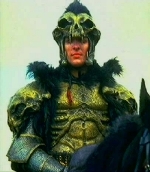John Bolton smokescreen...
Moderator: Dictators in Training
29 posts • Page 1 of 2 • 1, 2
John Bolton smokescreen...
Good Write up on Bolton from the NY Times...
http://www.nytimes.com/2005/05/12/opini ... oref=login
A Turning Tide for Bolton
By DAVID BROOKS
Published: May 12, 2005
Usually the bug dies. When a presidential nominee is treated like an ant under a magnifying glass under the noonday sun, when he has the full scrutiny of the media and Congressional investigators focused upon him, he usually gets incinerated.
Related More Columns by David Brooks
Readers
Forum: David Brooks's Columns
But over the past two weeks John Bolton's confirmation prospects have gotten stronger. What happened?
On April 19, Bolton's nomination was knocked off-track by Senators Chris Dodd and Joe Biden at a Foreign Relations Committee hearing. They made powerful presentations against Bolton, which clearly spooked several Republicans. So investigators were dispatched to interview dozens of Bolton's colleagues to get a deeper view of his conduct.
The interview transcripts suggest that Bolton could behave in a "fairly blunt manner" and that some people felt "undue pressure" to conform to his views, as John Wolf, a former assistant secretary of state, testified.
But they also reveal that Bolton has a professional sense of limits. He'd push his views, and push hard. But after he'd had his say, he would almost always bow to the dictates of the organization.
Here's an exchange between investigators and Robert Hutchings, a former chairman of the National Intelligence Council:
Q. After Mr. Bolton blew up, or reacted strongly, as you put it, when he heard that a lot of the Cuba judgments had been modified, did he do anything? What happened? What did he do after that?
HUTCHINGS This issue, it sort of went away. ... That was the end of it.
Q. He didn't seek to go behind your back and change these?
A. Not as far as I know. Those judgments were what they were, and--
Q. He let them stand.
A. Let them stand, yeah.
Here's an exchange with Wil Taft, a former legal adviser to the State Department:
Q. Is there any instance that you can recall where Secretary Bolton did not agree with your advice and sought to undermine it or otherwise ignore it?
TAFT No.
Q. So even though he may not have agreed with it, that's what the lawyer says, so that's what you've got to do?
A. Yes.
Here's an exchange with Colin Powell's chief of staff, Larry Wilkerson, about suggestions that Bolton change the text of a speech he was giving on nonproliferation issues:
WILKERSON There were changes.
Q. But - were those changes accepted?
WILKERSON Absolutely.
I could fill most of this page with exchanges of this sort. And I'm not even quoting from the interviews with Bolton's supporters. These transcripts show a man who was trying to advance a point of view while still generally operating within the bureaucratic structure of the State Department.
The speeches he gave on controversial subjects were generally cleared. Nobody was fired because of him. Nobody's career was damaged.
The other thing the transcripts reveal is that many fights over clearing speeches were not about intelligence - they were about policy. The speech-clearance process was the policy-making process. Often when Bolton was pushing back at his colleagues, he was trying to defend the president's policies from dissenters at State.
For example, Larry Wilkerson believed that America's Cuba policy was "the dumbest policy on the face of the earth," as he told GQ. He disagreed strongly with the idea of imposing sanctions on arms proliferators, as he told Senate investigators.
So when he challenged Bolton, Bolton would bend on most matters, but not on policy.
As Wilkerson himself told the Senate investigators: "There were some problems, on a number of occasions, with Under Secretary Bolton's proposed remarks. I found him to be, at that point, basically receptive to my changes that were culturally sensitive. ... I did not find him to be receptive when we talked about policy changes, fundamental policy changes in his speeches."
That's because Bolton's job was to stand up for the president's policies.
The momentum has shifted on the Bolton nomination because John Bolton turns out to be a more complicated figure than earlier portrayed. It's become clear that earlier tales of him chasing women down hallways are unreliable. It's become clear that while he's abrasive, he is professional. If Senator George Voinovich reads these transcripts before he votes, I'm sure Bolton will be confirmed.
E-mail: dabrooks@nytimes.com
http://www.nytimes.com/2005/05/12/opini ... oref=login
A Turning Tide for Bolton
By DAVID BROOKS
Published: May 12, 2005
Usually the bug dies. When a presidential nominee is treated like an ant under a magnifying glass under the noonday sun, when he has the full scrutiny of the media and Congressional investigators focused upon him, he usually gets incinerated.
Related More Columns by David Brooks
Readers
Forum: David Brooks's Columns
But over the past two weeks John Bolton's confirmation prospects have gotten stronger. What happened?
On April 19, Bolton's nomination was knocked off-track by Senators Chris Dodd and Joe Biden at a Foreign Relations Committee hearing. They made powerful presentations against Bolton, which clearly spooked several Republicans. So investigators were dispatched to interview dozens of Bolton's colleagues to get a deeper view of his conduct.
The interview transcripts suggest that Bolton could behave in a "fairly blunt manner" and that some people felt "undue pressure" to conform to his views, as John Wolf, a former assistant secretary of state, testified.
But they also reveal that Bolton has a professional sense of limits. He'd push his views, and push hard. But after he'd had his say, he would almost always bow to the dictates of the organization.
Here's an exchange between investigators and Robert Hutchings, a former chairman of the National Intelligence Council:
Q. After Mr. Bolton blew up, or reacted strongly, as you put it, when he heard that a lot of the Cuba judgments had been modified, did he do anything? What happened? What did he do after that?
HUTCHINGS This issue, it sort of went away. ... That was the end of it.
Q. He didn't seek to go behind your back and change these?
A. Not as far as I know. Those judgments were what they were, and--
Q. He let them stand.
A. Let them stand, yeah.
Here's an exchange with Wil Taft, a former legal adviser to the State Department:
Q. Is there any instance that you can recall where Secretary Bolton did not agree with your advice and sought to undermine it or otherwise ignore it?
TAFT No.
Q. So even though he may not have agreed with it, that's what the lawyer says, so that's what you've got to do?
A. Yes.
Here's an exchange with Colin Powell's chief of staff, Larry Wilkerson, about suggestions that Bolton change the text of a speech he was giving on nonproliferation issues:
WILKERSON There were changes.
Q. But - were those changes accepted?
WILKERSON Absolutely.
I could fill most of this page with exchanges of this sort. And I'm not even quoting from the interviews with Bolton's supporters. These transcripts show a man who was trying to advance a point of view while still generally operating within the bureaucratic structure of the State Department.
The speeches he gave on controversial subjects were generally cleared. Nobody was fired because of him. Nobody's career was damaged.
The other thing the transcripts reveal is that many fights over clearing speeches were not about intelligence - they were about policy. The speech-clearance process was the policy-making process. Often when Bolton was pushing back at his colleagues, he was trying to defend the president's policies from dissenters at State.
For example, Larry Wilkerson believed that America's Cuba policy was "the dumbest policy on the face of the earth," as he told GQ. He disagreed strongly with the idea of imposing sanctions on arms proliferators, as he told Senate investigators.
So when he challenged Bolton, Bolton would bend on most matters, but not on policy.
As Wilkerson himself told the Senate investigators: "There were some problems, on a number of occasions, with Under Secretary Bolton's proposed remarks. I found him to be, at that point, basically receptive to my changes that were culturally sensitive. ... I did not find him to be receptive when we talked about policy changes, fundamental policy changes in his speeches."
That's because Bolton's job was to stand up for the president's policies.
The momentum has shifted on the Bolton nomination because John Bolton turns out to be a more complicated figure than earlier portrayed. It's become clear that earlier tales of him chasing women down hallways are unreliable. It's become clear that while he's abrasive, he is professional. If Senator George Voinovich reads these transcripts before he votes, I'm sure Bolton will be confirmed.
E-mail: dabrooks@nytimes.com
What saves a man is to take a step. Then another step.
– C. S. Lewis
– C. S. Lewis
-

Lyion - Admin Abuse Squad

- Posts: 14376
- Joined: Wed Mar 10, 2004 1:42 pm
- Location: Ohio
John Bolton is a good guy, and here again we see the liberal smear tactics of trying to wipe somebody's name in the dirt because he's a republican.
“The more I study science the more I believe in God.” -- Albert Einstein
- Narrock
- NT Patron

- Posts: 16679
- Joined: Mon Mar 15, 2004 11:54 pm
- Location: Folsom, CA
Mindia wrote:John Bolton is a good guy, and here again we see the liberal smear tactics of trying to wipe somebody's name in the dirt because he's a republican.
OH NOEZ!!!!!1 Republicans have *never* stooped that low! They are pure little angels!
Mindia wrote:Yes Kizzy, and if given the opportunity I would love to SPIT in your face right now, you fucking PIG.
-

Diabolik - NT Bixie

- Posts: 0
- Joined: Sat Mar 27, 2004 8:18 am
- Location: Yo momma house
Gidan wrote:Its a political tactic. Has nothing to do with what party you represent.
Just saying both sides are guilty of it. Republicans are much better at it, though.
Mindia wrote:Yes Kizzy, and if given the opportunity I would love to SPIT in your face right now, you fucking PIG.
-

Diabolik - NT Bixie

- Posts: 0
- Joined: Sat Mar 27, 2004 8:18 am
- Location: Yo momma house
My aunt is Republican, and I didn't know this until I was at her house this weekend, and she had a picture of Bush and his wife. /cringe
Zanchief wrote:Harrison wrote:I'm not dead
Fucker never listens to me. That's it, I'm an atheist.
-

The Kizzy - NT Patron

- Posts: 15193
- Joined: Thu Mar 11, 2004 9:48 pm
- Location: In the closet with the ghosts
Republican Senator, John Voinovich wrote:It is my opinion that John Bolton is the poster child of what someone in the diplomatic corps should not be.
Did you also know that over 100 former US ambassadors, most of them Republican appointees, have signed a letter in protest of Bolton's appointment? Yeah, none of THEM know what qualities are essential in a good ambassador. And I'm also sure that all of those Republican appointees are somehow part of the vast liberal conspiracy, right?
-Arlos
-

Arlos - Admin Abuse Squad

- Posts: 9021
- Joined: Thu Mar 11, 2004 12:39 pm
I have a big framed picture of George and Laura on my wall. My parents have one too, signed by W... it's a big Christmas card they got last December for being supporters of Bush.
“The more I study science the more I believe in God.” -- Albert Einstein
- Narrock
- NT Patron

- Posts: 16679
- Joined: Mon Mar 15, 2004 11:54 pm
- Location: Folsom, CA
It was only 59 and just because they were appointed by a party that doesn't mean they themselves were. I'm sure there are many dems in the diplomatic corp working for Bush right now.
Inside each person lives two wolves. One is loyal, kind, respectful, humble and open to the mystery of life. The other is greedy, jealous, hateful, afraid and blind to the wonders of life. They are in battle for your spirit. The one who wins is the one you feed.
-

Martrae - Admin Abuse Squad

- Posts: 11962
- Joined: Mon Mar 15, 2004 9:46 am
- Location: Georgia
Actually, Martrae, a 2nd group of > 40 of them also signed it. Also, no administration is going to appoint someone who has vastly different values and beliefs to important positions such as Ambassador, as they're the direct representitve of the nation and administration, and as such are specifically appointed by the administration. There's a big difference between "working in the diplomatic corps" and being appointed as Ambassador.
Not to mention, even if it were only 59, and regardless of affiliation, isn't it telling that these people have spoken out against him? Who knows BETTER what qualities are necessary than someone who's done the job?
-Arlos
Not to mention, even if it were only 59, and regardless of affiliation, isn't it telling that these people have spoken out against him? Who knows BETTER what qualities are necessary than someone who's done the job?
-Arlos
-

Arlos - Admin Abuse Squad

- Posts: 9021
- Joined: Thu Mar 11, 2004 12:39 pm
They're all a bunch of appeasers...err diplomats. Anyone that might rock the boat and jeopardize their round of parties and fundraisers is automatically distrusted. Glorified Used Car Salesmen.
Inside each person lives two wolves. One is loyal, kind, respectful, humble and open to the mystery of life. The other is greedy, jealous, hateful, afraid and blind to the wonders of life. They are in battle for your spirit. The one who wins is the one you feed.
-

Martrae - Admin Abuse Squad

- Posts: 11962
- Joined: Mon Mar 15, 2004 9:46 am
- Location: Georgia
YOR NAMES MICHEAL BOLTONZ?!11
Tossica: No, you're gay because you suck on cocks.
Darcler:
Get rid of the pictures of the goofy looking white guy. That opens two right there.
Mazzletoffarado: That's me fucktard
Darcler:
Get rid of the pictures of the goofy looking white guy. That opens two right there.
Mazzletoffarado: That's me fucktard
Vivalicious wrote:Lots of females don't want you to put your penis in their mouths. Some prefer it in their ass.
-

Captain Insano - Nappy Headed Ho

- Posts: 8368
- Joined: Fri Apr 16, 2004 1:04 pm
- Location: SoCal
That's my point, Arlos. They are overly diplomatic.
Inside each person lives two wolves. One is loyal, kind, respectful, humble and open to the mystery of life. The other is greedy, jealous, hateful, afraid and blind to the wonders of life. They are in battle for your spirit. The one who wins is the one you feed.
-

Martrae - Admin Abuse Squad

- Posts: 11962
- Joined: Mon Mar 15, 2004 9:46 am
- Location: Georgia
What. The. Fuck.
They're DIPLOMATS. Being diplomatic is their JOB.
Gee, you think that pissing off other countries or organizations that you're trying to get to go along with your agenda might be, shall we say, counter-productive?
I know you're not this stupid. What *POSSIBLE* reason would there be to have an un-diplomatic diplomat? The very concept is an oxymoron. So, what you're telling me is that the US tradition of oh, what, 225 years, of actually having diplomatic people in diplomatic posts is a monumental screw-up? (and that's just the US, you want to talk western civ history, we're talking what, thousands of years?) You're saying that we should have been assigning belligerent and abrasive people to try and convince friends and enemies to go along with our agenda all along? Is that what you're trying to tell me? /boggle
-Arlos
They're DIPLOMATS. Being diplomatic is their JOB.
Gee, you think that pissing off other countries or organizations that you're trying to get to go along with your agenda might be, shall we say, counter-productive?
I know you're not this stupid. What *POSSIBLE* reason would there be to have an un-diplomatic diplomat? The very concept is an oxymoron. So, what you're telling me is that the US tradition of oh, what, 225 years, of actually having diplomatic people in diplomatic posts is a monumental screw-up? (and that's just the US, you want to talk western civ history, we're talking what, thousands of years?) You're saying that we should have been assigning belligerent and abrasive people to try and convince friends and enemies to go along with our agenda all along? Is that what you're trying to tell me? /boggle
-Arlos
-

Arlos - Admin Abuse Squad

- Posts: 9021
- Joined: Thu Mar 11, 2004 12:39 pm
There's diplomatic in the sense of using tact and understanding to get what you want and then there's diplomatic in the sense of kissing everyone's ass to keep the peace.
Inside each person lives two wolves. One is loyal, kind, respectful, humble and open to the mystery of life. The other is greedy, jealous, hateful, afraid and blind to the wonders of life. They are in battle for your spirit. The one who wins is the one you feed.
-

Martrae - Admin Abuse Squad

- Posts: 11962
- Joined: Mon Mar 15, 2004 9:46 am
- Location: Georgia
29 posts • Page 1 of 2 • 1, 2
Who is online
Users browsing this forum: No registered users and 3 guests





